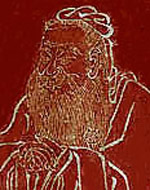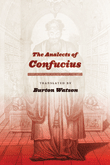Reviews
The Unproblematic ConfuciusBurton Watson. The Analects of Confucius. Columbia 2007. HB, $19.95
The following appeared in The China Review (Hong Kong), v9 #1 (2009). Reprinted by permission
The known virtues of a Watson translation — colloquial ease of language, content so smoothed as to require little explanation — are evident in this Analects. Also evident are the corresponding shortcomings: loss of sonority, loss of social difference, loss of political context. We then need only ask: (1) How well does this method work with the Analects? and (2) What sort of Confucius does the resulting Analects present? The short answers are that it does not work very well, and that it presents a Confucius whose contradictions are left unresolved for modern readers.
I
The Watson method does not work very well because, with the Analects, the lost political context is often essential to the meaning. Watson aims to render the Analects sayings "in the colloquial English that would be used if those conversations took place today" (p13), and leads the reader to hope that this will render them universally intelligible, as "an embodiment of sentiments and ideals that are relevant to all of human society" (p12). True to this strategy, Watson as an annotator confines himself to identifying historical figures. He quotes commentaries rarely, and sometimes only to remark that they disagree (LY 3:22, 13:14, and 14:26). Having implied that the commentary literature is a mere tangle of misunderstandings, Watson cuts the sayings loose to be meaningful on their own. But the Analects in its time was closely engaged with political realities, and many of the sayings do not work well as generalized wisdom. Some are simply unintelligible, and Watson often registers his own perplexity (LY 1:13, 2:8, 2:16, 6:26, 7:28, 8:20, 9:17, 12:2, 12:10, 14:10, 14:16, 14:39, 15:26, 16:12, and 16:14). At one point (10:22), he suggests giving up: "Readers are advised to ignore it." The device of throwing an enigmatic and unexplained text at the reader thus seems to be in trouble even before the book has left the author's desk.
There are also errors. Embarrassingly enough, some occur in passages which translators on Watson's short list of "Other Translations" (p13-14) have gotten right. One is LY 13:22, where familiarity with the Yi would have saved Watson (as it earlier saved Waley) in the last line. That passage is not against divination. It rather wrests ethical value from the diviner's rule that you can't just sit on good luck (or personal virtue); you also have to do something. As it might have been rendered in Watsonian English, "You don't just divine and that's it." In a New Testament text which will be familiar to Watson's readers, the Epistle of James (at 2:14.17) notes an analogous need for works — for social doing — to make faith effective: virtue is not enough. One recalls LY 4:25, "virtue is not solitary." Here are parallels that readers might find interesting. The Watson version of LY 13:22 actually reads, "And the Master said, No need to consult a diviner to know that much!" Is this capable of linking up with an "ideal that is relevant to all of human society?" Not so obviously. It's colloquial enough, but it's also opaque.
II
The contradictions of the Analects Confucius are left unresolved because Watson declines to resolve them. Waley long ago distinguished between historical and scriptural translations. The need to choose between them is noted by Watson on p. 6, where he seems to opt for the latter, in a translation which will reflect how the text "has traditionally been read and understood over the centuries in China." Fine. But despite this disclaimer (and despite a passing acknowledgement, on p12, that the Analects was compiled at different periods), he seems in practice to view the Analects both as embodying timeless wisdom and as going back to the specific Confucius. Watson proposes to read the Analects "as a unified whole" (p6), and at no point does he refer to any period later than the death of Confucius. It is clearly the historical Confucius, the actual guy of the early 05th century, that Watson sees himself as delivering to the reader, and he sees that Historical Confucius as reflected equally at all points in the Analects.
That position is no longer tenable. The Analects writers were closely engaged with ways of thought which emerged only long after Confucius's death. Not only its writing down, but its composition, happened in later centuries. How do we know that this is so? From these:
- The famous remark "the father should be a father" (LY 12:11), and other familiar phrases in that Analects chapter and the next, appear verbatim in Legalist writings which Rickett dates to the 04th century. Confucius did not live in the 04th century.
- The famous definition of the central Confucian virtue rvn as "love" in LY 12:22 is pure Mician. Nobody who is anybody imagines that Confucius lived in the time of Mwodz or his followers.
- The "rectification of names" famously insisted upon in LY 13:3 (an obvious interpolation, which breaks the continuity of the surrounding text) is a key doctrine of the 03rd century philosopher who, to avoid mystification, we will spell as "Sywndz."
- The human nature issue, famously debated between Sywndz and his Mencian opponents, is alluded to in LY 17:2, along with several small gibes at the pedagogy of Sywndz. What is Confucius doing here?
- The famous LY 18:5 is a near repeat of a story in a text which Watson used to romanize as Chuang Tzu, now as Zhuangzi (but which is more readily pronounced by new readers if spelled "Jwangdz"). What miracle of time travel puts Confucius in this later age?
Watson, who has previously translated all but one of the contact texts mentioned above, was in a uniquely favorable position to elucidate these encounters. He has let that opportunity get away from him: in none of these passages does he mention the external parallel. In this intertextual territory we may say of Watson, as Bohr said of Einstein when Einstein rejected the quantum mechanics he had earlier done so much to create, "We miss our leader."
The bottom line is that besides a smattering of the real Confucius (and even the greenest reader might care to know where in the text that Confucius is to be found), the Analects spends much of its time fighting ideas which arose only long after Confucius was dead. To explicate the text on Watson's "unified whole" assumption cannot produce a unified result. Given the text's own mixed character, it can only produce confusion.
One point of possible confusion which Watson treats in his Introduction is whether Confucius had anything to do with the Chinese Classics. He calls this purported connection a legend (p2), which is right, but he does not replace the legend with anything else, and his translation (like the Analects itself) often portrays Confucius as a bookish man. The textualization of Confucianism is one of many panoramas which a differentiated Analects opens to the viewer (The Original Analects, 255f). But if read in Watson's way, simply as a pile of sayings, the Analects gives opposite signals, some implying an empirical ethic (7:22, "three men walking"), and others a bookish one (16:13, on memorizing the Classics). If anything, Watson himself goes for bookish. At LY 7:16, he adopts the variant Yi (the Classic of Changes), where most scholars prefer adverb yi "indeed," and thus makes Confucius a deep student of the Yi. And it is as a bookish man that the cover of the review copy pictures Confucius: eight times life size, with a fully staffed Italianate library behind him. Watson's Introduction thus points one way, while the visuals, and parts of the text as Watson presents it, point another way. What is the reader to think?
III
Watson has established himself as the translator of choice for early Chinese texts whose message is the plain or the oppositional, the exciting or the grotesque. Those texts too had their connections with the life around them, but without that context there is still something left to enjoy for its own sake. With the gnomic and particular Analects, where the connection to contemporary reality is both intimate and essential, Watson is out of his depth. These things need to be explained to a modern audience, and explanation is not Watson's way.
As was said of old, and we cannot do better than quote Watson's own rendition: "Don't you know about the praying mantis that waved its arms angrily in front of an approaching carriage, unaware that they were incapable of stopping it?" With the Analects, one feels, Watson too has come up against something that is beyond the range of his characteristic strengths.
The field owes Watson much. It is to be hoped that those who will ultimately assess his contribution will pass lightly, and with an understanding eye, over the present effort.
E Bruce and A Taeko Brooks
University of Massachusetts at AmherstNext: The Watson Rejoinder
9 Nov 2007 / Contact The Project / Exit to Reviews Index Page


